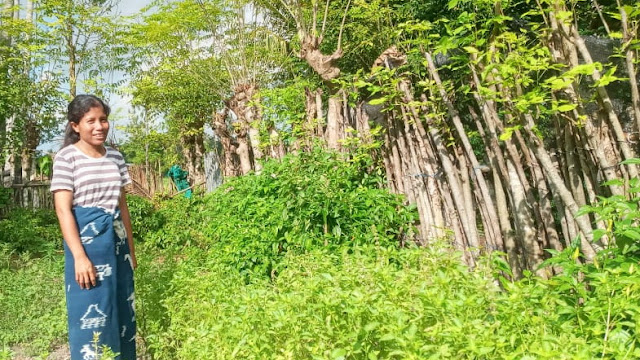East Sumba, one regency in the province of East Nusa Tenggara, on Sumba Island, with 22 districts that’s dominated by vast fields and home gardens, either managed and unmanaged. In general, these lands are planted with long-lived trees (mahogany, sandalwood, teak, moringa, coconut, and cashew), and some are planted with seasonal crops (corn, peanuts, petatas/sweet potatoes). Residents also use their yards to grow vegetables and fruit, and they even raise flowers to beautify their yards.
The love of planting is a hobby of mine, Ningsih Rambu Nani, from Mburukulu, Pahunga Lodu District, about 100 kms from Waingapu to the east. I am a teacher at State Junior High School No. 1 of Rindi, in Tanaraing, Rindi District, and I stay at the school mess. Even in the mess, I try to optimize the yard by making a vegetable garden like I did at home. This activity grew out for the motivation that I found when I studied at Sumba Christian Church's Theological College (STT) in Lewa, while the inspiration I got when I took a part in the Stube HEMAT Sumba training. Starting from hearing stories from friends about Stube HEMAT Sumba, whose activities increase knowledge and equip young people to be creative and innovative, I was then interested in taking part in entrepreneurial training to make decorations from dry coral, snail shells, and seashells. This activity made a big impression on me and since then I started to be smarter about using the things around me to make something interesting.
My experience of studying and doing activities at Stube HEMAT Sumba made me think about creating something good around me, one of which is using my yard for vegetable garden and planting flowers. I do these two things because I like flowers and I can have a source of vegetables so I do not need to buy vegetable I need. I planted mustard greens, kale, long beans, cassava, beans, tomatoes, chilies, and several kitchen spices, such as shallots, turmeric, lemongrass, galangal, basil, and pandan leaves, while the fruit trees planted were bananas and papaya.
However, during the process I face challenges when chickens often enter the garden and damage the plants, and difficulty getting nets to fence off the garden from roaming chickens. Apart from that, I have difficulty dealing with pests that attack chili plants, especially chili fruit, both the young ones and ready-harvested fruit become rotten. Some harvest is consumed personally and the rest is sold directly and some is sold in the form of processed products, such as chilies into chili sauce which is marketed directly or via social media.
People responded well and supported me in making a garden and managing the results, even then branding emerged that ‘if there is Ningsih there must be a vegetable garden’. Several people followed me by making gardens too, especially the local government supported it by creating a 'dasawisma' group (a group of several neighboring houses) in Mburukulu village, so this is a good thing for mutual support for all groups from individuals, community groups, and the government in creating living kitchens to meet family needs. From this activity, I can enjoy fresh vegetables from my garden, and even kitchen spices are available, especially those living far from stalls and markets that open on certain days only.
The last, I want to invite my young friends to use yard to create a garden and plant various vegetables, herbs, flowers, and long-lived trees. Be sure that all of these are useful. ***


.jpg)



x.jpg)




.jpg)


Comments
Post a Comment